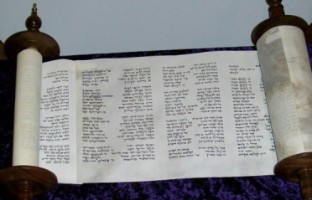And Jesus sang

After all this time I thought I knew Jesus really well. Then just last week—preparing to preach at a congregational celebration of word and music—I discovered something unsettling about him. If my concordance is telling the truth, then he never played an instrument, never led his followers in song, never hummed a refrain or sang himself to sleep. After all these years, this is like learning that he never skipped a stone on water or warmed his hands at a fire. How is it possible to be fully human without ever making music?
But it seems to be true. Jesus said some things about people who enjoyed the sounds of trumpets and flutes, but the references were not positive. He told a story about an elder brother coming home from a hard day's work to hear music and dancing inside his father's house, but those sounds did not make the brother happy. I know some Christians have decided to ban musical instruments from worship on these grounds—but surely there are other ways to interpret the evidence.
1) Maybe the Gospel writers did not think singing was important for establishing the identity of the messiah. They certainly did not think laughing was important, because Jesus never laughs in the Gospels either. Maybe the evangelists just wrote down the things they thought were pertinent to making their case—the birth, the teachings, the death, the resurrection—and left out the things they judged incidental, like the fact that Jesus made the best hummus in the Galilee or was a wizard at the harmonica.
2) Maybe there was nothing to sing about while Jesus walked this earth, with the Romans occupying his homeland and his countrymen at each other's throats about how to get rid of them—with the poor getting poorer while the rich got richer and taxes going through the roof. Maybe only the most clueless, out-of-touch people he knew sat around playing instruments and singing songs while they stuffed themselves so they could not hear the people camped outside their doors hoping for a chance to go through their kitchen garbage. Maybe Jesus could not sing while things like that were going on, so he fasted from music the same way other people fasted from food—to stay in touch with those who had nothing to sing about the way things were.
3) Or maybe the Gospel writers thought everyone knew the tunes to some of the most famous things Jesus said—like the Beatitudes, the Lord's Prayer or his last words from the cross. When I first learned my way through Luke, my teacher told me that the Magnificat was sung in the early church, along with the Song of Simeon. Why not the Lord's Prayer? Maybe the music just vanished after everyone who knew it died, so that only the words remained for those who came later. Music speaks to our soft parts, and soft parts are as vulnerable as flesh, as grass, as the lilies of the field. Maybe that is what happened to Jesus' music. It went back to where it came from until he comes again, singing us back into the presence of God.
After I had searched sing, song, music, play and the names of at least six ancient musical instruments, I tried hymn and struck the jackpot. According to both Matthew and Mark, it is possible that Jesus sang at least once. On the first night of Passover, after he had shared his last supper with his friends, they did one last thing together before they headed out into the night. "When they had sung the hymn," both evangelists say, "they went out to the Mount of Olives" (Matt. 26:30, Mark 14:26).
How had I missed that verse? How many Maundy Thursday suppers had I sat through without ever asking what that hymn was or why we were not singing it, in our dogged attempt to remember everything Jesus had done that night? It only took a minute with a study Bible to discover the answer and confirm it with a rabbi: if Jesus and his friends were singing a hymn after supper, there is every reason to believe it was the Hallel—Psalms 113 through 118—sung during evening prayers on the first night of Passover from Jesus' day to our own.
Precious in the sight of the Lord
is the death of his faithful ones.
O Lord, I am your servant;
I am your servant, the child of your serving girl. (Ps. 116:15–16)
I know there are others ahead of me on this, but this is the first time I have heard Jesus sing—the Lord to whom I pray praying to the Lord. Now the words will never lie quietly on the page again. If this essay reaches you in time, find that hymn so you can sing it with him on Maundy Thursday. Jesus may only have sung once, but when he did, the Word Made Flesh became Music as well.



